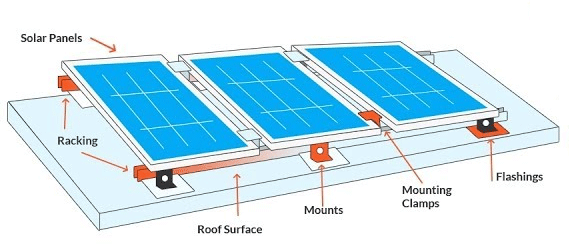Solar Power for Your Home
Renewable Energy. Environmentally Friendly. Energy Cost Savings.
The most practical solution for your home in the UK is Solar power because other types of renewable energy are not readily available. Solar panel electricity systems, also known as photovoltaics (PV), capture the sun's energy using photovoltaic cells. These cells don't need direct sunlight to work – they can still generate some electricity on a cloudy day. The cells convert the sunlight into electricity, which can be used to run household appliances and lighting.
Benefits of Solar Electricity:
Cut your electricity bills
Sunlight is free, so once you've paid for the initial installation, your electricity costs will be reduced.
Cut your carbon footprint
Solar electricity is green renewable energy and doesn't release any harmful carbon dioxide or other pollutants. A typical home solar PV system could save around 1.3 to 1.6 tonnes of carbon per year (depending where you are within the UK).
Earn Money Back
With the Smart Export Guarantee (SEG), you can make money by selling surplus energy back to the grid. The SEG requires that all suppliers with over 150,000 customers must offer an export tariff for electricity sold back to the grid. To date, the way the tariff is set up is up to the individual suppliers. This means that small-scale solar PV generators will be able to earn money back from their investment.
Solar panels prices have steadily decreased over the last couple of years. As new technologies are being developed, experts discover new ways of making solar energy components. Thus, in the not so distant future, the likelihood of solar cell prices going down is significant.
We recognise that Solar Power is an important investment decision and may seem like a big commitment.
But thats where Mahuika Ltd come in. With experience in the energy business we can offer you personalised advice about your homes energy efficiency and recommend the right products:
we help you to choose the system that is designed for you and your electrical needs
procure the components directly from suppliers (saving money)
and have qualified installers and electricians with decades of experience in the construction industry
If you're interested in solar panels for your home, and you would like to know more about your renewable energy options, Mahuika Ltd is here for you. Our service is simple and obligation free. Just fill in the non-binding Contact form at the top and we will get back to you shortly.
The main components of a solar power system
Solar power systems are made up of:
Solar Panels
Inverter
Racking/mounting
Solar panels
Sunlight falls on the Solar Panels (a group of these is called a Solar Array) during daylight hours. They convert the sun’s energy into Direct Current (DC) electricity. There are different types of panels (e.g. polycrystalline, monocrystalline, thin film), and various brands but usually you will want to get good quality ones that will last 25+ years instead of “cheap and cheerful” ones lasting only a few years.
Inverter
These are either a string inverter (around the size of a briefcase), microinverters (around the size of a paperback book), or power optimisers, that are kind of a hybrid between the two. A string inverter is installed on a wall and all the solar panels connect to it. A microinverter goes on the back of each solar panel. The job of the inverter is to convert the DC electricity solar panels produce into 240V AC electricity, which is what everything in your home uses. The inverter is the component most likely to fail in a solar power system in the first 10-15 years. This is because they work hard all day, and they do wear out.
Racking/mounting
This is what is securely attached to your roof supports, and what your solar panels are mounted on. There are a wide variety of racking brands out there. The difference between a budget end brand and a premium end brand is mainly cost and durability.
Battery Storage
Battery storage needs to be reviewed properly on residential installs in the UK to ensure the return on investment is acceptable. However technology advancements are fast in this area so if the design of the system doesn’t include this, install your system now and simply add batteries in a few years once costs have come down.





